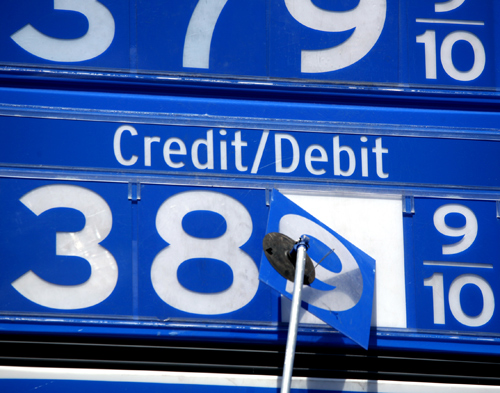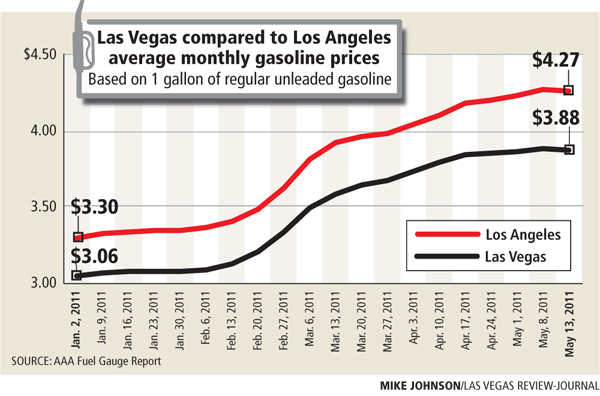Gasoline prices about to fall, analysts say
Tired of shelling out $50, $60, $70 -- or more -- to fill up your vehicle?
The wallet-draining torment at the pump won't go away completely. But analysts think it will ease a little.
The reduction in pump prices has been scant so far, down 0.3 cents at $3.892 a gallon on Friday from one day earlier and even with one week ago, according to the AAA Fuel Gauge survey. But industry analysts see this, and the recent drop in crude oil prices, as the start of a trend that could shave anywhere from 15 to 50 cents off the per gallon price by the Fourth of July.
"Generally speaking, the expectation is that gas prices should soon start softening and continue into the July period," said Las Vegas economist Jonathan Galaviz.
He foresees a decline of 20 to 30 cents a gallon, or less than 10 percent. By contrast, the AAA survey reports prices having risen 27 percent in Las Vegas from the start of the year and 30 percent in Los Angeles, the region's largest source of tourists.
Peter Krueger, state executive of the Nevada Petroleum Marketers and Convenience Store Association, predicts a drop of 8 to 12 cents a gallon by the Memorial Day holiday. "From our standpoint, the numbers are telling us that the supplies are good," he said.
For him, July is "too far out there to think about."
And it's not just oil and gasoline. Demand for farm commodities, such as the corn used in everything from cereal to soda, has dropped. And businesses remain slow to pass along higher costs because customers aren't getting raises and might walk away.
Inflation isn't much of a worry for economists these days.
"I think the bulk of the big price increases are over," said Gus Faucher, an economist at Moody's Analytics.
Last week, oil prices sank by the most in 2½ years. Americans drive less when gasoline prices get high enough, and concerns about slowing energy demand sent oil prices tumbling -- from $114 at the start of May to just under $100 on Friday.
The prices of milk, bread and chicken won't fall as fast -- it could take six months or longer, analysts say -- but they could decline by the end of the year. That's because the price of corn and other grains have fallen. Overseas ranchers are using less corn for feed, and U.S. farmers have planted more.
Food prices had risen in March at the fastest rate in three years.
For gasoline, the major caveat that could darken the outlook includes factors that have nothing to do with American driving habits. For much of the past year, the main focus has been on rising demand in other countries as their economies grow plus political instability in the Middle East.
But the floodwaters now coursing down the Mississippi River toward Louisiana add another dark cloud. "More than 2 million barrels a day of refining capacity is adjacent to or near the river ... from Baton Rouge south to the delta," said Tom Kloza, the publisher of the Oil Price Information Service. "If refineries are flooded, we'll see the dramatic increases in gasoline and diesel that are normally associated with hurricane landfall."
If the worst is avoided, he predicts, prices in the West will soon start dropping about 50 cents a gallon during the summer, which would mean about $3.40 in Las Vegas and $3.75 in Southern California. "The bigger the run-up, the harder the fall," Kloza said. "Prices there moved too high."
Gasoline prices often affect Las Vegas visitation.
In March, the car count on Interstate 15 at Primm fell 4.2 percent, only the sixth drop in the past 27 months. During the low point of the recession in 2008, traffic was off 5.3 percent.
But as it started to rebound over the next two years, it helped keep the local economy from turning even nastier, because the number of visitors arriving at McCarran International Airport dropped at a faster clip. Surveys by the Las Vegas Convention and Visitors Authority consistently show that one-fourth of Las Vegas tourists come from Southern California.
Even if prices stay near $4 a gallon in Southern California, Kloza does not believe the impact will be as severe as three years ago, when pump prices hit their all-time high. The main difference, he said, is that the economy generally has started growing instead of contracting.
Contact reporter Tim O'Reiley at toreiley@reviewjournal.com or 702-387-5290. The Associated Press contributed to this report.


















